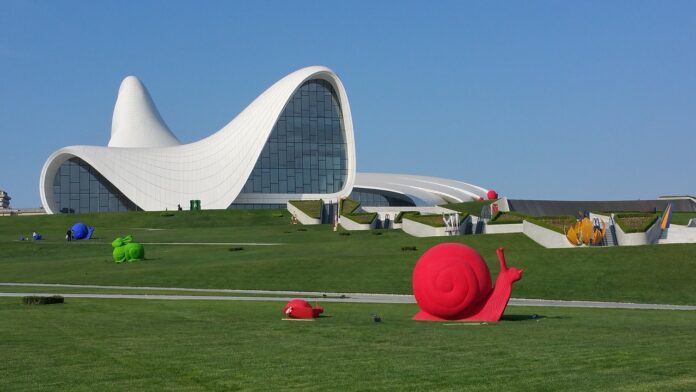Baku, the capital of Azerbaijan, is a vibrant city where history meets modernity. Located on the Caspian Sea, Baku has grown into one of the most dynamic and culturally rich cities in the Caucasus region. Known for its striking skyline, fascinating historical sites, and a blend of Eastern and Western influences, Baku offers visitors a unique experience that combines ancient traditions with contemporary innovations. In this article, we’ll explore the highlights of this captivating city, from its rich heritage to its modern developments.
**A Blend of Ancient and Modern Architecture**
Baku is famous for its unique architectural landscape that brings together centuries-old traditions and cutting-edge designs. The city’s Old Town, also known as the *Icherisheher* (Inner City), is a UNESCO World Heritage site and houses landmarks such as the Maiden Tower, the Palace of the Shirvanshahs, and the ancient city walls. These structures reflect the city’s rich history and its significance as a major trade center along the Silk Road.
In contrast, the modern side of Baku is defined by futuristic buildings such as the Flame Towers, three sleek skyscrapers that light up the skyline and symbolize the country’s energy-rich heritage. The Heydar Aliyev Center, designed by renowned architect Zaha Hadid, is another architectural masterpiece that demonstrates Baku’s embrace of innovative design. This futuristic structure, with its fluid curves and flowing lines, stands as a testament to the city’s progressive outlook.
**Cultural Heritage and Museums**
Baku is a city deeply rooted in its cultural heritage, offering a variety of museums, galleries, and cultural centers. The Azerbaijan National Museum of Art houses an extensive collection of Azerbaijani and international artwork, showcasing the city’s appreciation for both local and global culture. The Museum of Modern Art in Baku is another popular destination for those interested in contemporary works.
Baku’s rich Islamic heritage is also represented through its beautiful mosques and religious buildings, such as the Taza Bazaar Mosque and the Juma Mosque. These landmarks not only highlight the city’s spiritual importance but also reflect its historical role in the region.
**The Caspian Sea and Waterfront**
Baku’s location on the Caspian Sea makes it an attractive destination for those who love waterfront views and activities. The Baku Boulevard, a long promenade stretching along the Caspian coastline, offers stunning views of the sea and the city’s skyline. Visitors can enjoy leisurely walks, dine in cafes, or visit the Baku Ferris Wheel, offering panoramic views of the city.
The Caspian Sea also plays a vital role in Baku’s economy, with the city being a major center for the oil industry. The oil wealth has shaped the city’s development and contributed to its rapid modernization over the last few decades.
**Culinary Delights**
Baku is a food lover’s paradise, offering a rich and diverse culinary scene. Azerbaijani cuisine is a fusion of Middle Eastern, Turkish, and Persian influences, characterized by flavorful meats, fresh herbs, and a variety of breads and pastries. One of the most popular dishes is *plov*, a rice dish often served with lamb or chicken, accompanied by vegetables and fruits. The city’s kebabs, especially *shashlik*, are a must-try for visitors, as well as *dolma*, grape leaves stuffed with rice, meat, and spices.
For a unique experience, visitors should explore the city’s bustling markets, such as the Taza Bazaar, where they can sample fresh produce, spices, and traditional sweets. Baku is also home to a growing number of international restaurants, ensuring that every palate is catered for.
**The Flame of Modernity: Baku’s Economy and Growth**
Baku’s rapid development has been driven by its rich oil reserves and its strategic location. In recent years, the city has evolved into a global business hub and a key player in the energy sector. The city’s wealth from oil has facilitated significant investment in infrastructure, tourism, and the arts.
The Baku International Sea Trade Port, located just outside the city, is one of the busiest ports in the Caspian region, further cementing the city’s importance as a center of commerce and trade. Additionally, Baku is positioning itself as a key destination for international events, such as the Eurovision Song Contest 2012 and the 2015 European Games.
**Festivals and Events**
Baku is known for hosting a wide range of cultural and international events throughout the year. The Baku International Jazz Festival attracts music lovers from around the world, while the Baku International Film Festival showcases the best of global cinema. The city also celebrates various traditional festivals, such as *Novruz*, the Azerbaijani New Year, with vibrant performances, food, and street celebrations that highlight the cultural diversity of the city.
In addition, Baku is known for its thriving art scene, with numerous galleries, theater performances, and concerts happening year-round. The city’s blend of cultural richness and modern developments makes it a lively and exciting place to visit.
**Conclusion**
Baku is a city of contrasts, where ancient history and modern innovation coexist in perfect harmony. With its remarkable architecture, rich cultural heritage, dynamic economy, and beautiful waterfront, Baku offers something for everyone. Whether you’re drawn to its historical sites, contemporary attractions, or thriving food scene, this city on the Caspian Sea promises to leave a lasting impression on all who visit. As it continues to grow and evolve, Baku is poised to become one of the most important cultural and economic centers in the region.


